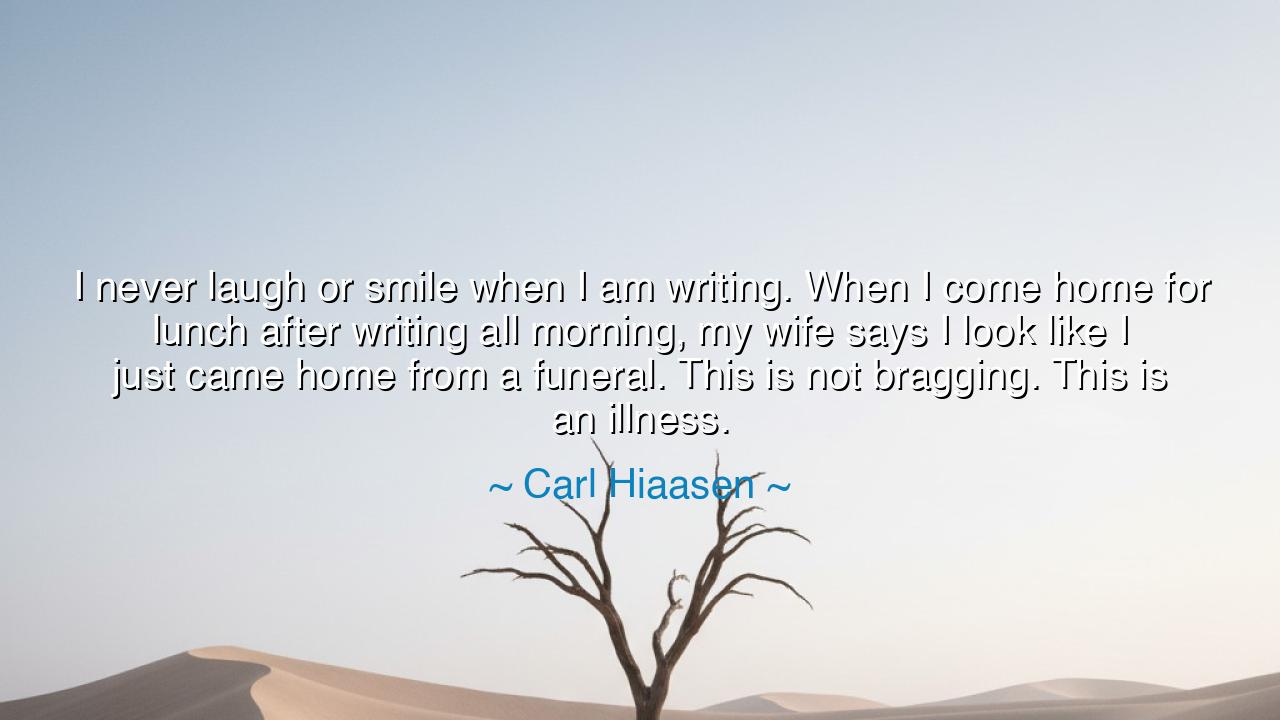
I never laugh or smile when I am writing. When I come home for
I never laugh or smile when I am writing. When I come home for lunch after writing all morning, my wife says I look like I just came home from a funeral. This is not bragging. This is an illness.






Hear the haunting confession of Carl Hiaasen, who declared: “I never laugh or smile when I am writing. When I come home for lunch after writing all morning, my wife says I look like I just came home from a funeral. This is not bragging. This is an illness.” These words, though cloaked in irony, speak to the heavy toll of creation, to the silent battles of the artist who labors not in mirth but in shadow. He admits that his craft, which brings laughter to readers, leaves upon his own face the look of grief. The paradox is powerful: that one who gifts the world with humor may himself wear the mask of solemnity.
The origin of this wisdom lies in the ancient burden of the artist, a figure both blessed and cursed. From the poets of Greece to the playwrights of Elizabethan England, creators have often borne the fire of their art as both light and torment. Hiaasen, known for his satire, for his wit that skewers corruption and folly, reveals here that the act of writing does not fill him with laughter, but with strain. The smile appears only on the lips of the reader, never on the face of the craftsman. It is as though the artist must bleed seriousness so that others may drink joy.
History recalls many who bore this same contradiction. Robin Williams, the great comedian, made millions laugh until their sides ached, yet he himself often carried a sorrow deeper than words could touch. His art brought delight to the world, yet his soul knew heaviness. Or think of Franz Kafka, whose writings carved the anxieties of modern existence into immortal form. His letters and diaries reveal a man who considered his writing both necessity and torment, unable to smile at the very work that made him unforgettable. Hiaasen joins this lineage: artists who make others laugh while themselves walking with solemn faces.
The meaning of Hiaasen’s words, then, is not boast but warning. He calls it an illness, this inability to smile while creating. It is a reminder that creativity is not always joy, but often a struggle against the weight of thought, against the perfection demanded by the soul. To write satire is to stare long at the absurdities, injustices, and cruelties of the world. How could one laugh when dwelling daily upon such things? The laughter is forged not in the moment of writing, but in the alchemy that transforms pain into art.
The lesson for us is twofold. First, we must remember that the joy we receive from art often comes at a cost to the artist. Let us be grateful, and let us not assume that because their works bring us delight, their lives are filled with ease. Second, for those who create: do not neglect your spirit. Hiaasen calls it an “illness” because he knows that the solemnity of art can consume. Balance is needed, rest is needed, laughter is needed outside the page, lest the burden of creation become too heavy for the soul.
Practical action must follow. If you are a creator, permit yourself breaks of joy. Step away from your work to laugh with family, to breathe fresh air, to remember that you are more than the words or works you labor to bring forth. If you are a lover of art, honor the humanity of the artist; do not forget that behind the polished book, the performance, or the painting is a person who struggles as deeply as anyone else. Extend compassion to them, even as their work brings you delight.
Thus the teaching is sealed: art is both gift and burden, joy and sorrow intertwined. Carl Hiaasen, in his honest confession, reminds us that the smile upon the reader’s face is often born of the furrow upon the writer’s brow. Let us then honor the paradox: that through the solemn toil of the artist comes the laughter of the world, and through our gratitude and compassion, the artist may find the strength to smile once more.






AAdministratorAdministrator
Welcome, honored guests. Please leave a comment, we will respond soon